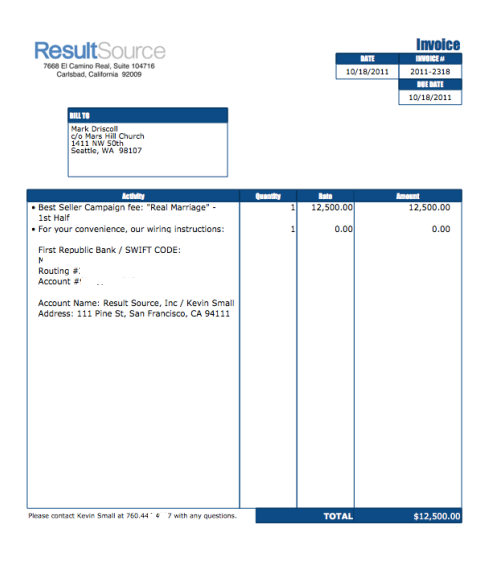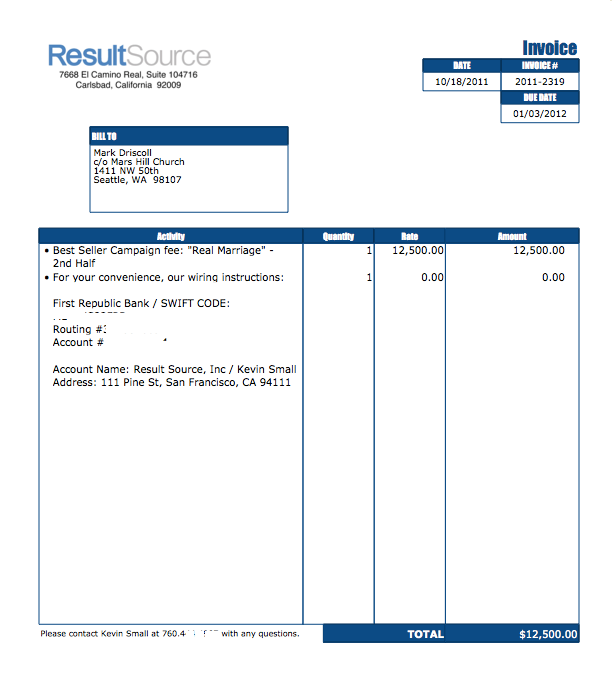We Love Mars Hill is a website with stories of people who once loved and attended Mars Hill Church but eventually felt hurt by the church in some manner. A story yesterday by former Mars Hill Albuquerque member Darlene Lopez caught my eye. Darlene Lopez wrote about “demon trials” that a fellow Mars Hill member went through. During the trial, the friend became convinced that she and Lopez should not be friends. This bewildered Lopez, who attended the Albuquerque franchise, so she looked up the protocol for “demon trials” on the Mars Hill website. She and her husband left the church soon afterwards. Referring to her friend (“she of the blue said…”), Lopez described the demon trials:
A couple months passed and then she of the blue said, “I don’t want to be your friend. I went to a demon trial”. Apparently, the elders were doing demon trials on members or anyone who had oppression in their life. Mark Driscoll wrote this whole procedure on how to summon, and then put on trial the demons that are oppressing the believer. It all sounded strange to us. I asked her why she couldn’t be my friend and she said my name was brought up in a demon trial. I asked her what that meant, and she didn’t answer any more questions other than “talk to your elder about it, but that she would no longer ask me for prayer, talk to me about spiritual things, etc. without giving any other reasons. She said we were still welcome to attend community group, though. A flood of emotions came in, there was no sin issue as we had already dealt with her concerns of gossip/talking too much two months prior so I didn’t understand why now she didn’t want to be friends. Her defense was that she should have listened to God two months ago and not be my friend. I asked her if she saw any changes in our friendship since then. She said yes, that we were talking less on the phone and that when we did talk we were praying and keeping it Christ-centered. To this day she says she ended our friendship because of “sin.” But it wasn’t until that demon trial that things changed.
We got a copy of the formality of the demon trial that Mark Driscoll wrote, and my husband thought it was very wacky and unbiblical.
You too can read about the procedure to conduct a demon trial on the Mars Hill website (how long will this remain on the site?) (it is now on the Wayback Machine). It is also a note on Mark Driscoll’s Facebook page (now on the Wayback Machine). It is too long to reproduce here (go read it while it is still up, but if they take it down I will post a copy), but I want to put up a couple of startling excerpts.
First, Mars Hill and Driscoll apparently consider depression and mental illness to be manifestations of the demonic. Consider the following aspects of the spiritual inventory a person who might go through a demon trial should consider:
- Please consider the following list and list each thing that has been besetting and/or habitual for you: bestiality, habitual lying, physically unhealthy, masturbation, lying, pornography, ongoing depression, suicidal thoughts, alcohol abuse, drug use, anger, blasphemy, violence, self-inflicted injury, rape, incest, eating disorders, mental illness, pedophilia, and anything else that comes to mind.
- Please consider the following list of sins that may have been committed against you or by you: rape, incest, molestation, other forms of abuse (e.g., physical, sexual, mental, emotional), as well as anything else that comes to mind.
- Please briefly explain any involvement you may have had with the occult, witchcraft, or anything spiritual other than orthodox biblical Christianity.
- Please briefly list any of your ancestors and any activity they may have been involved in with the occult, witchcraft, other religions, drug use, alcohol abuse, sexual deviancy, rape, incest, mental illness, and anything else listed above or that comes to mind.
To the degree that Mars Hill pushes this teaching, they are part of the problem identified in 2013 via research by Lifeway. Ed Stetzer at Lifeway reported that 48% of evangelicals believe prayer and Bible study alone can cure serious mental illness. In the case of Mars Hill, apparently prayer, Bible study and a demon trial can work.
As depicted on the Mars Hill website, a demon trial is what it sounds like. A person who struggles with any of the issues on that list above is brought into a room with ministers and the demon assumed to be in the person is put on trial via a 12 step process. The “counselee” is expected to cooperate fully:
Step #4 – Explain the counselee’s participation.
- Our authority is in Christ.
- You must tell the entire truth.
- Tell me everything the demon tells you, no matter how odd it may seem.
- Tell me everything you see, no matter how odd it may seem.
- Pride and fear will hinder our progress.
In my opinion, these instructions sets up the situation for the counselee to feel responsible if the “trial” fails.
Step 10 attempts to identify the root causes of the problems faced by the counselee (presumably mental illness continues to be on the list):
Step #10 – Ask the Spiritual Inventory questions.
Often it is best to begin with addressing ancestral sin and address it first because it tends to have the deepest root in someone’s life. The counselee can pray something like, “Lord Jesus, if there are any spirits who have anything to do with me, body, soul, or spirit because of my ancestral sin, I ask that you please forgive this sin and cancel any ground they have held against me.”If there are any demons working in (name) in the area of (issue), we bind all of you together along with all of your works and effects and command that you come forward.
We now command that spirit holding highest authority of all those bound and brought forward in the area of (issue) to step forward alone. We put a hedge of thorns around you, above you, and below you. You will not be interfered with by anyone.
With the demon now identified and speaking through the counselee, the Mars Hill exorcist can talk directly to the demon:
Then address that spirit holding highest authority of the group bound and brought forward and ask them.
In the name of the Lord Jesus Christ . . .
- What is your name?
- Will that stand as truth before the White Throne of the Lord God Almighty?
- You have responded to the name ______, we bind you by that name and upon command you will go to the pit bound by that name with all of your works and effects and all of your associates and their works and effects as well.
- When did you come?
- Will that stand as truth before the White Throne of the Lord God Almighty?
There are more questions to ask the demon but you can read the rest. This procedure should be repeated to make sure all demons are removed:
Finally, command that the highest-ranking spirit remaining other than the Holy Spirit (if there is one) step forward and identify themselves to ensure none has been overlooked. Complete the process of cleansing. Close with a general prayer to cover anything that may have been overlooked.
Over the years, I have seen the damage this approach can cause. People with mental illness, in their desperation, have sought out these experiences only to be worse off afterwards. The stigma against mental illness is a barrier to effective treatment of treatable conditions and management of chronic conditions. Procedures such as described here are certainly part of the problem.
Here is the entire post from Driscoll’s Facebook page:
Want to tell Mars Hill to stop linking mental illness and demon trials? Write them here.

